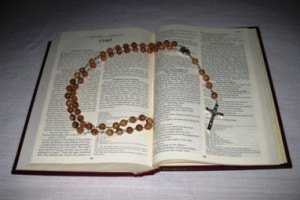“…he is truly a nonbeliever who thinks he believes something which he really does not believe.” –Leo Tolstoy
 My spiritual wiring is primarily intellectual rather than emotional. My brain was Catholic before my heart was. As such, I have a latent mistrust of things that have what I perceive to be an overly emotional quality to them. I cringe at charisma, nodding in stoic affirmation with T.S. Eliot when he claims that “it is not enthusiasm, but dogma, that differentiates a Christian from a pagan society.” I’ve had very little in the way of “emotional consolations” when it comes to my practice of the faith, and that’s never really bothered me. My wife says I’m a robot. At least I’m pretty sure I’m programmed correctly
My spiritual wiring is primarily intellectual rather than emotional. My brain was Catholic before my heart was. As such, I have a latent mistrust of things that have what I perceive to be an overly emotional quality to them. I cringe at charisma, nodding in stoic affirmation with T.S. Eliot when he claims that “it is not enthusiasm, but dogma, that differentiates a Christian from a pagan society.” I’ve had very little in the way of “emotional consolations” when it comes to my practice of the faith, and that’s never really bothered me. My wife says I’m a robot. At least I’m pretty sure I’m programmed correctly
The question I have for myself, however (and it’s one that recurs), is whether intellectual assent is enough to constitute actual belief. “Emergent church” types often delineate the difference between “orthodoxy” and “orthopraxy”; more simply, right doctrine and right practice. This is where the disconnect for me usually occurs.
It’s one thing to attest to certain truths about the nature of reality and the responsibilities we have as Catholic human beings. It’s another altogether to apply them. I wish that, at the end of time, as I awaited my particular judgment, that instead of an inventory of my life, I could be given a Catholic trivia game. I would ace it. Instead, however, I know (at least intellectually) that I’ll be judged based on the kind of human being I’ve been. That inspires fear in me (at least intellectually).
I think that the main reason that so many of us who have a good handle on the intellectual side of the faith have so much trouble living it out is because we are seldom radically tested. The testing of our faith, St. James writes in his epistle, develops perseverance. The reality is that the kinds of tests most of us face regularly are not the kinds which are readily recognizable as tests. Perhaps if we were to recognize the dozens of seemingly insignificant decision-making moments that we face daily as opportunities for heroic virtue, we might develop perseverance in the face of those tests. Our brains would engage our bodies, and our Catholicism would be more than just a state of mind.
“Courage,” writes C.S. Lewis, “is not simply one of the virtues, but the form of every virtue at the testing point.” There are no intellectual martyrs that I know of, just bodily ones. But the courage of the martyrs at the point of testing brought their virtues to bear in a radical way. If we could see the seemingly small decisions we face daily as a true choice between “life and death, blessing and curse” (Deut 3:19), then perhaps we could take a step toward moving our Christianity out from our brains to colonize the rest of our bodies.











